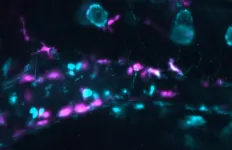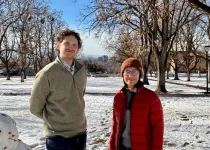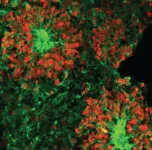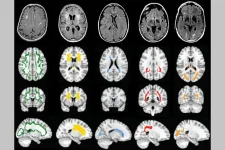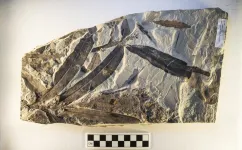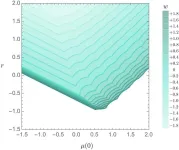(Press-News.org) Downloadable assets for media use:
https://uoregon.canto.com/b/MSHJ8
EUGENE, Ore. — Dec. 18, 2024 — After a meal of questionable seafood or a few sips of contaminated water, bad bacteria can send your digestive tract into overdrive. Your intestines spasm and contract, efficiently expelling everything in the gut — poop and bacteria alike.
A new study from the University of Oregon shows how one kind of bacteria, Vibrio cholerae, triggers those painful contractions by activating the immune system. The research also finds a more general explanation for how the gut rids itself of unwanted intruders, which could also help scientists better understand chronic conditions like inflammatory bowel disease.
“This isn’t a specific nefarious activity of the Vibrio bacteria,” said Karen Guillemin, a microbiologist at the UO who collaborated on the work with biophysicist Raghu Parthasarathy. “The gut is a system where the default is, when there’s damage, you flush.”
The research was led by Julia Ngo, a now-graduated doctoral student in Guillemin and Parthasarathy’s labs, and published Nov. 22 in the journal mBio.
Vibrio cholerae is best known for causing cholera, a severe illness that infects millions of people per year, often via contaminated water. A related Vibrio species is frequently linked to food poisoning from shellfish.
In past work, Parthasarathy’s lab has shown that Vibrio cholerae bacteria amped up the strength of gut contractions in zebrafish. These fish, which are transparent as larvae, are a powerful tool for studying the dynamics of microbes in the gut because scientists can visualize what’s happening in real time.
The team pinned the effect on a sword-like surface appendage that Vibrio bacteria usually use as a weapon against other microbes. Disarming the bacteria calmed the gut contractions — but they weren’t sure how or why.
The key, they show in this new research, is a type of immune cell called a macrophage.
Normally, macrophages tamp down the activity of neurons in the gut, keeping them calm and allowing things to move through the gut at a normal speed. But in response to tissue damage from the bacteria, the macrophages leave their posts and flock to the site of calamity, leaving the neurons unattended. Without macrophages to keep things in check, the neurons end up in overdrive, triggering strong contractions.
“It’s amazing how dynamic all these cells are, the macrophages racing across the fish, the neurons and muscles pulsing with activity,” Parthasarathy notes. “Without the ability to observe these phenomena in live animals, tracking cells and measuring gut contractions, we wouldn’t have figured any of this out.”
Those enhanced gut contractions are beneficial for the host, whether zebrafish or human.
“If the macrophages have to go deal with an injury, then it actually makes a lot of sense for the neurons to freak out and just push everything out of the gut,” Guillemin said. “If there's something in the gut that's causing injury, you want to get it out of there.”
The gut flushing is probably beneficial for the bacteria, too, giving them speedy access to new hosts. But Guillemin cautions against giving too much agency to microbes. The fact that Vibrio’s weaponry against other bacteria also triggers this strong intestinal response probably isn’t an exquisite adaptation, she said, but rather a convenient coincidence.
The study also highlights how cross talk between the immune and nervous systems might play an underappreciated role in gut health, Parthasarathy suggested. Deciphering how microbes influence that cross talk might give scientists new insights into a range of puzzling diseases.
This work was supported by the National Science Foundation and the National Institutes of Health.
About the University of Oregon College of Arts and Sciences
The University of Oregon College of Arts and Sciences supports the UO’s mission and shapes its identity as a comprehensive research university. With disciplines in humanities and social and natural sciences, the College of Arts and Sciences serves approximately two-thirds of all UO students. The College of Arts and Sciences faculty includes some of the world’s most accomplished researchers, and the more than $75 million in sponsored research activity of the faculty underpins the UO’s status as a Carnegie Research I institution and its membership in the Association of American Universities.
Media Contact:
Molly Blancett
University Communications
blancett@uoregon.edu
541-515-5155
END
Bad bacteria can trigger painful gut contractions; new research shows how
UO researchers unravel the mechanism behind an unpleasant symptom of digestive problems
2024-12-17
ELSE PRESS RELEASES FROM THIS DATE:
Partnership advances targeted therapies for blood cancers
2024-12-17
Huntsman Cancer Institute at the University of Utah (the U) has joined other institutions in an innovative clinical trials program designed to match patients with acute myeloid leukemia (AML) and myelodysplastic syndromes (MDS) with a clinical trial specifically designed for the genetic signature of their disease. Sponsored by the National Cancer Institute (NCI), the myeloMATCH program aims to improve precision medicine, the use of therapies ...
How loss of urban trees affects education outcomes
2024-12-17
It’s well established that urban tree cover provides numerous environmental and psychological benefits to city dwellers. Urban trees may also bolster education outcomes and their loss could disproportionately affect students from low-income families, according to new research by University of Utah social scientists.
Economics professor Alberto Garcia looked at changes in school attendance and standardized test scores at schools in the Chicago metropolitan region over the decade after a non-native ...
New virtual reality-tested system shows promise in aiding navigation of people with blindness or low vision
2024-12-17
A new study offers hope for people who are blind or have low vision (pBLV) through an innovative navigation system that was tested using virtual reality. The system, which combines vibrational and sound feedback, aims to help users navigate complex real-world environments more safely and effectively.
The research from NYU Tandon School of Engineering, published in JMIR Rehabilitation and Assistive Technology, advances work from John-Ross Rizzo, Maurizio Porfiri and colleagues toward developing a first-of-its-kind ...
Brain cells remain healthy after a month on the International Space Station, but mature faster than brain cells on Earth
2024-12-17
LA JOLLA, CA—Microgravity is known to alter the muscles, bones, the immune system and cognition, but little is known about its specific impact on the brain. To discover how brain cells respond to microgravity, Scripps Research scientists, in collaboration with the New York Stem Cell Foundation, sent tiny clumps of stem-cell derived brain cells called “organoids” to the International Space Station (ISS).
Surprisingly, the organoids were still healthy when they returned from orbit a month later, but the cells had matured faster compared ...
NIH grant funds study of cerebral small vessel disease
2024-12-17
Researchers at Washington University School of Medicine in St. Louis have been awarded $7.5 million from the National Institutes of Health (NIH) to investigate a form of dementia caused by cerebral small vessel disease, the second-leading cause of dementia after Alzheimer’s disease.
The grant funds the Vascular Contributions to Cognitive Impairment and Dementia (VCID) Center, which is a National Institute of Neurological Disorders and Stroke “Center Without Walls” initiative that will coordinate researchers at six sites across ...
Paranoia may be, in part, a visual problem
2024-12-17
New Haven, Conn. — Could complex beliefs like paranoia have roots in something as basic as vision? A new Yale study finds evidence that they might.
When completing a visual perception task, in which participants had to identify whether one moving dot was chasing another moving dot, those with greater tendencies toward paranoid thinking (believing others intend them harm) and teleological thinking (ascribing excessive meaning and purpose to events) performed worse than their counterparts, the study found. Those individuals more often — and confidently — claimed one dot was chasing the other when it wasn’t.
The findings, published Dec. 17 in ...
The high cost of carbon
2024-12-17
The social cost of carbon — an important figure that global policymakers use to analyze the benefits of climate and energy policies — is too low, according to a study led by the University of California, Davis.
The study, published today in the journal Proceedings of the National Academy of Sciences (PNAS), shows that current estimates for the social cost of carbon, or SCC, fail to adequately represent important channels by which climate change could affect human welfare. When included, the SCC increases to just over $280 per ton of CO2 emitted in 2020 — more than double the ...
This mysterious plant fossil belongs to a family that no longer exists
2024-12-17
In 1969, fossilized leaves of the species Othniophyton elongatum — which translates to “alien plant” — were identified in eastern Utah. Initially, scientists theorized the extinct species may have belonged to the ginseng family (Araliaceae). However, a case once closed is now being revisited. New fossil specimens show that Othniophyton elongatum is even stranger than scientists first thought.
Steven Manchester, curator of paleobotany at the Florida Museum of Natural History, has studied 47-million-year-old fossils from Utah for several years. While visiting ...
Physicists ‘bootstrap’ validity of string theory
2024-12-17
String theory, conceptualized more than 50 years ago as a framework to explain the formation of matter, remains elusive as a “provable” phenomenon. But a team of physicists has now taken a significant step forward in validating string theory by using an innovative mathematical method that points to its “inevitability.”
String theory posits that the most basic building blocks of nature are not particles, but, rather, one-dimensional vibrating strings that move at different frequencies ...
Parents’ childhood predicts future financial support for children’s education
2024-12-17
UNIVERSITY PARK, Pa. — Childhood circumstances, such as parental divorce or growing up poor, have been shown to influence health and other outcomes later in life. But does a person’s experiences in childhood also influence their future ability to provide financial support to their children?
According to a new study from a researcher from Penn State, parents who endured difficult childhoods provided less financial support to their children’s education such as college tuition compared to parents who experienced few or no disadvantages. Regardless of current socioeconomic ...
LAST 30 PRESS RELEASES:
Yale study challenges notion that aging means decline, finds many older adults improve over time
Korean researchers enable early detection of brain disorders with a single drop of saliva!
Swipe right, but safer
Duke-NUS scientists identify more effective way to detect poultry viruses in live markets
Low-intensity treadmill exercise preconditioning mitigates post-stroke injury in mouse models
How moss helped solve a grave-robbing mystery
How much sleep do teens get? Six-seven hours.
Patients regain weight rapidly after stopping weight loss drugs – but still keep off a quarter of weight lost
GLP-1 diabetes drugs linked to reduced risk of addiction and substance-related death
Councils face industry legal threats for campaigns warning against wood burning stoves
GLP-1 medications get at the heart of addiction: study
Global trauma study highlights shared learning as interest in whole blood resurges
Almost a third of Gen Z men agree a wife should obey her husband
Trapping light on thermal photodetectors shatters speed records
New review highlights the future of tubular solid oxide fuel cells for clean energy systems
Pig farm ammonia pollution may indirectly accelerate climate warming, new study finds
Modified biochar helps compost retain nitrogen and build richer soil organic matter
First gene regulation clinical trials for epilepsy show promising results
Life-changing drug identified for children with rare epilepsy
Husker researchers collaborate to explore fear of spiders
Mayo Clinic researchers discover hidden brain map that may improve epilepsy care
NYCST announces Round 2 Awards for space technology projects
How the Dobbs decision and abortion restrictions changed where medical students apply to residency programs
Microwave frying can help lower oil content for healthier French fries
In MS, wearable sensors may help identify people at risk of worsening disability
Study: Football associated with nearly one in five brain injuries in youth sports
Machine-learning immune-system analysis study may hold clues to personalized medicine
A promising potential therapeutic strategy for Rett syndrome
How time changes impact public sentiment in the U.S.
Analysis of charred food in pot reveals that prehistoric Europeans had surprisingly complex cuisines
[Press-News.org] Bad bacteria can trigger painful gut contractions; new research shows howUO researchers unravel the mechanism behind an unpleasant symptom of digestive problems
